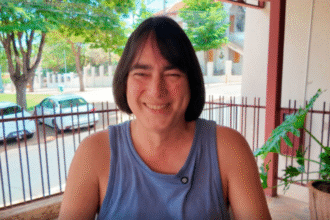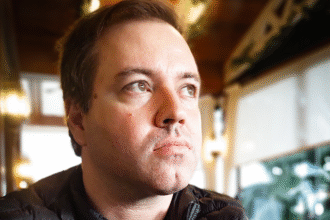If Jesus were alive, where would he be and what would he do? Even those who are far from Christianity must have wondered about the subject or been involved in heated debates filled with theories about what could happen if the prophet returned to the world. It is a question that goes beyond the limits of religiosity, as it arouses the curiosity of the population and also inspires various cultural productions, such as “Irmandade da Cruz”, by Luiz Henrique Carvalho Mourad.
For Dan Brown fans, the Brazilian author also interprets situations from the Bible that were consummated almost as absolute truths. However, in this release, the Holy Grail that drives the plot of “The Da Vinci Code” would not be the chalice used by Christ at the Last Supper. Furthermore, from the idea that the prophet is alive, the writer builds a narrative full of riddles and threats that put the whole world in danger.
In the story, a journalist receives an invitation to join the Brotherhood of the Cross, a secret society responsible for protecting Jesus and keeping him in safe places over the centuries. At first, the protagonist does not believe in this work, but, during a discussion with one of the organization’s leaders, he is convinced. The problem is that the association faces external threats after one of the members tries to take revenge and expose the whereabouts of the prophet.
With great twists and interpretations of biblical situations, Luiz Henrique builds a plot capable of involving both atheists and people of faith. Through theories and historical facts, he narrows the differences between fiction and reality, leading the reader to question how true this book can be.
Born in Jundiaí, in the interior of São Paulo, Luiz Henrique Carvalho Mourad works in business administration. Never leaving aside his own religious beliefs, he studied for the corporate area while deepening his knowledge of spirituality. Member of several esoteric orders and passionate about literature, he is inspired by authors such as Eliphas Levi, Athanasius Kircher, Stanislas de Guaita and Paracelsus. “Irmandade da Cruz”, published by Madras, marks his debut in his literary career.
How does the premise that Jesus is alive and protected by a secret society affect the narrative of “Brotherhood of the Cross”? What are the main enigmas and threats that arise in the plot?
Luiz Henrique: The whole plot of the story is based on this, that Jesus was resurrected, but continues to live until today. Everything revolves around a member who, unhappy with some situations, promises to reveal to the world the secret they keep. And it’s up to the main character to keep that secret at all costs. It is for this reason that he, being unknown to all other members, is invited to be part of this Order.
Could you share some of the interpretations of biblical situations present in the book and how they contribute to the construction of a plot full of mysteries and dangers? How is the protagonist of the book, who initially doubts the existence of the secret society, convinced of its reality? What is his role in the story?
First, he goes to his destination for being a journalist with a keen nose, realizing that the reasons given for the initial invitation, apparently, did not fit very well. It was this doubt that led him to accept the invitation. When faced with the truth, at first he doubted completely, as it would be something far beyond our sphere of understanding, but living with the members and his meeting with a person in particular, makes him start to change inside and transform himself into a another man. As for biblical interpretations, we can briefly say that the god of the old testament is not the father of Jesus, on the contrary, Jesus would have come exactly to say that to the Jews, that they worshiped the wrong God. So much so that there is a passage where Jesus says to the Jews: “You are of your father the devil”… there are several other biblical passages,
In the second book of Samuel, chapter 24, verse 1, it is written: “The anger of Yahweh was kindled against Israel, and he incited David against them: ‘Go’: he said, and number Israel and Judah”
Already in the first book of Chronicles, chapter 21, verse 1, it is written: “Satan rose up against Israel and induced David to take a census of Israel”
But there are several other passages, as I also make a parallel between what the bible says and what science says, showing that they are similar.
“Irmandade da Cruz” mixes fiction and reality, addressing theories and historical facts. How do you blur the line between fiction and reality to engage readers? To what extent does the book raise questions about the truth and to what extent can the speculations presented be considered plausible?
When we talk about spirituality, nothing is certain! There is no absolute truth. What I did was try to elucidate, in the light of science, passages that are often obscure, but all the passages, date, historical characters, places, tombs and texts mentioned exist, nothing was created or invented. This means that the reader, if he wants to look for the facts, can do so by researching what he will find, in addition to leaving a hint of doubt at the end of the reading about to what extent this story is a fiction or a reality.
What are your main literary inspirations and how do they influence the construction of the plot and the development of the characters in “Irmandade da Cruz”? How do you use your own religious beliefs and knowledge of spirituality in writing the book?
In reality, although I read a lot of ancient occultists, I always say that this book “came to me”, it was an inspiration, because many passages I don’t remember writing them and it even changed my way of seeing many things.

How does “Brotherhood of the Cross” manage to attract both atheist readers and people of faith? What main message do you intend to convey through this diversified approach?
The book comes to talk about something simple called “love and inner transformation”. It doesn’t matter what the reader’s religion is, or even if he doesn’t have any, we all seek, in our most intimate, love and transformation, and that’s what the book tries to convey. So no person, religious or atheist, will ever feel offended, however, I believe there will be a new way, however small, for everyone to look at life a little differently.
How has the public and critics received your debut in your literary career with “Irmandade da Cruz”?
I have received several feedbacks from readers who really liked the book, some even commented that they had the feeling of answers to many questions in their lives, which has made me very happy. For although the book has a plot, as happens in the books of theDan Brown, he has spiritual teachings that accompany the entire trajectory of the main character, as in the book The Alchemist, by Paulo Coelho.
Follow Luiz Henrique Carvalho Mourad on Instagram





